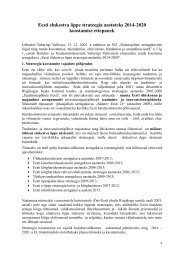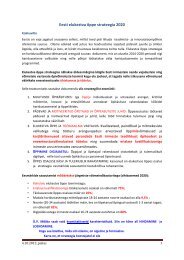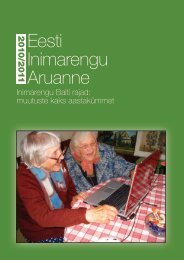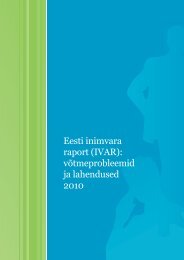Estonian Human Development Report
Estonian Human Development Report - Eesti Koostöö Kogu
Estonian Human Development Report - Eesti Koostöö Kogu
Create successful ePaper yourself
Turn your PDF publications into a flip-book with our unique Google optimized e-Paper software.
Table 4.2.2. shows the association between the indicators<br />
of life satisfaction and social integration. When evaluating<br />
social integration, the following individual and<br />
aggregate variables have been used: political interest (How<br />
interested are you in politics?), trust in institutions (How<br />
much do you trust the country’s parliament / legal system /<br />
police / political parties / European Parliament / UN?), perceived<br />
discrimination (Is your group discriminated against<br />
because of skin colour / race / nationality / religion / ethnic<br />
group / language you speak?) and social capital (How often<br />
do you socially meet with friends, relatives, colleagues? Is<br />
there anyone you discuss intimate and personal matters<br />
with? How often do you take part in social activities compared<br />
to others of same age?).<br />
The analysis of satisfaction dimensions and associations<br />
is the same as the one in Table 4.2.1. It turns out<br />
that the life satisfaction evaluations of Estonia’s ethnic<br />
minorities are significantly related to the perception of<br />
discrimination – the lower the level of perceived discrimination,<br />
the greater the satisfaction with the performance<br />
of the state and the personal sense of happiness.<br />
It is noteworthy that in the majority of European<br />
countries there is no significant relationship between<br />
the perception of discrimination and satisfaction with<br />
the performance of the state. At the same time, Estonia’s<br />
ethnic minorities perceive discrimination more often<br />
than the minorities in European countries on average<br />
(see Annex 4.2.1.). Thus, for example, the perception of<br />
minority discrimination in the United Kingdom, with<br />
a relatively large and diverse ethnic minority, is almost<br />
10% lower than in Estonia and even 20% lower than<br />
Estonia in Denmark with a growing number of immigrants.<br />
Estonia’s other important distinction compared to<br />
the European average is the importance of the social<br />
network as a shaper of satisfaction among ethnic minorities<br />
– the closer the social network, the more satisfied<br />
Estonia’s ethnic minorities are with the state. And vice<br />
versa – estrangement from the state is related to greater<br />
isolation in one’s close surroundings. This is especially<br />
related to contacts with <strong>Estonian</strong>s and other ethnicities<br />
at work and during leisure time (see Korts & Vihalemm<br />
2008). This relationship is probably bidirectional – on<br />
the one hand, it is easier for individuals who are socially<br />
active and have a wider social circle to become aware of<br />
what is happening in the country and to adapt; however,<br />
on the other hand, a positive social attitude promotes<br />
involvement in work-related and other social networks.<br />
At the same time, Annex 4.2.2. shows that compared<br />
to European minorities Estonia’s ethnic minorities are<br />
characterized by significantly lower social capital with<br />
respect to the extent of the social network, participation<br />
in nongovernmental organizations and trust. However,<br />
differences in the social capitalization of majority and<br />
minority groups are decreasing in younger age groups,<br />
in Europe on average as well as in Estonia (see Annex<br />
4.2.2.).<br />
Summary<br />
In Estonia, life satisfaction depends, to a greater degree, on<br />
ethnic affiliation than it does in Europe on average. Estonia<br />
is also differentiated in the general European scene by<br />
larger gaps in the life satisfaction evaluations of the eth-<br />
Table 4.2.2. Association of life satisfaction with<br />
social integration among ethnic minorities in Estonia<br />
and Europe (correlation coefficient in Estonia, average<br />
for European minorities in parentheses)<br />
Aggregate<br />
satisfaction<br />
index<br />
* Political interest either high or very high.<br />
** The social capital index is calculated on the basis of single variables:<br />
meets frequently with friends, relatives, co-workers; has someone to<br />
discuss personal affairs with; compared to contemporaries and participates<br />
often in social activities.<br />
*** The trust index is calculated on the basis of single variables: trust in<br />
the parliament, legal system, police, politicians, political parties, European<br />
Parliament and UN.<br />
*** The discrimination index calculated on the basis of single variables:<br />
has encountered discrimination based on skin colour or race, ethnicity,<br />
religion, ethnicity or spoken language.<br />
Source: European Social Survey 2006<br />
Personal<br />
mental<br />
satisfaction<br />
Personal<br />
material<br />
satisfaction<br />
Satisfaction<br />
with<br />
the performance<br />
of the state<br />
Interest in politics* 0.172 (0.159) 0.130 (0.084) 0.073 (0.138) 0.215 (0.141)<br />
Social capitalization** 0.207 (0.123) 0.176 (0.094) 0.094 (0.105) 0.238 (0.080)<br />
Trust in institutions***0.483 (0.403) 0.351 (0.237) 0.377 (0.194) 0.475 (0.449)<br />
Discrimination<br />
rate****<br />
-0.322 (-0.098) -0.286 (-0.086) -0.147 (-0.011) -0.361 (-0.119)<br />
Average 0.296 (0.196) 0.236 (0.125) 0.173 (0.112) 0.322 (0.197)<br />
nic majority and minorities – compared to the majority,<br />
the members of ethnic minority groups are less frequently<br />
satisfied, especially among the middle-aged and younger<br />
generations.<br />
While in the “old” EU member states the general satisfaction<br />
of ethnic minorities is strongly related to evaluations<br />
regarding the performance of the country’s economic<br />
system and democracy, in Estonia, in a similar<br />
manner to the majority of post-Communist transition<br />
states, the satisfaction of ethnic minorities tends to be<br />
shaped by subjective factors (primarily one’s personal<br />
sense of happiness). At the same time, the subjective satisfaction<br />
is quite strongly related to indicators of social integration<br />
– the strength of personal social networks and the<br />
perception or non-perception of discrimination. In Estonia,<br />
one’s relationship with the performance of the state as<br />
intermediated by the social network is also characterized<br />
by the fact that critical evaluations regarding state policies<br />
do not significantly differ between Russian-speakers<br />
who are personally more or less successfully integrated<br />
(see Lauristin 2008).<br />
Conditionally one could say that unlike other European<br />
countries, a “cultural capsule” is created in Estonia<br />
upon defining oneself as an ethnic minority group. Ethnic<br />
barriers in society do not disappear by themselves<br />
since dissatisfaction with life compared to <strong>Estonian</strong>s does<br />
not decrease in younger generations. The relatively weak<br />
social capital of Estonia’s minorities and its significance in<br />
the shaping of life satisfaction leads to the conclusion that<br />
investing in the growth of social capital for ethnic minorities<br />
and their more effective involvement in the life of the<br />
country do not jeopardize the performance of the nationstate.<br />
Instead, such measures are the basis for shaping reliable<br />
relations with the state.<br />
85 |















